
The Difference Between Berberine and Berberine Phytosome
Berberine supplementation has gained widespread attention in the health and wellness community for its potential health benefits, particularly in supporting metabolic health including weight loss.
However, with the introduction of berberine phytosome, confusion may arise regarding the differences between these two formulations. Learn the differences between berberine and berberine phytosome in this blog to help you make informed choices about which supplement may be right for you.

Berberine Vs. Berberine Phytosome
Berberine: The Plant Compound
Berberine is a natural compound found in various plants, including goldenseal, barberry, and oregon grape. Known for its vibrant yellow colour, berberine has been used for centuries in traditional medicine for its potential health benefits, including supporting blood sugar levels, cardiovascular health, and gastrointestinal function.
Berberine Phytosome: Enhanced Absorption
Berberine phytosome is a specialised form of berberine that has been formulated for enhanced bioavailability and absorption. In this formulation, berberine is bound to phospholipids derived from sunflower oil, creating a unique molecular complex that enhances its solubility and uptake in the body.
Key Differences:
The primary difference between berberine and berberine phytosome lies in their absorption and bioavailability. While berberine on its own has relatively low absorption rates, berberine phytosome is designed to overcome this limitation, having 9.6x higher levels of absorbable berberine reaching systemic circulation, potentially enhancing possible health benefits.
Benefits of Berberine Phytosome:
Berberine phytosome offers several advantages over traditional berberine supplements. By improving absorption, berberine phytosome may require lower doses to achieve health benefits, reducing the risk of gastrointestinal side effects commonly associated with higher doses of berberine.
Additionally, the enhanced bioavailability of berberine phytosome may lead to more consistent and predictable results in supporting metabolic health and other targeted health goals.
Choosing the Right Option:
When considering whether to use berberine or berberine phytosome, it's essential to weigh the factors of absorption, dosage, and intended health goals. Individuals who prefer a natural, unaltered form of berberine may opt for traditional berberine supplements. On the other hand, those seeking enhanced absorption and potentially lower doses may find berberine phytosome to be a more suitable option.
Dosage
- Berberine: At least 500 mg - 1500 mg per day.
- Berberine Phytosome: Take 275 mg per day
People Also Ask…
Should I take berberine or inositol for PCOS?
You can take both Inositol and berberine together, however we recommend not taking both alongside medication such as metformin until you have spoken to your doctor. Read more on our Inositol Vs Berberine for PCOS Guide.
What is the difference between Berberine HCl and Berberine Phytosome?
Berberine HCl is the hydrochloride salt form of berberine, which is commonly used in traditional berberine supplements. While Berberine HCl provides the active compound berberine, its absorption in the body may be limited due to its low solubility. Whereas, Berberine Phytosome has a higher solubility and bioavailability of berberine. Therefore, Berberine Phytosome may require lower doses to achieve similar outcomes compared to Berberine HCl.
By Rhysa Phommachanh, BA (hons) Specialist Hair and Media Make-up / Head of Digital






